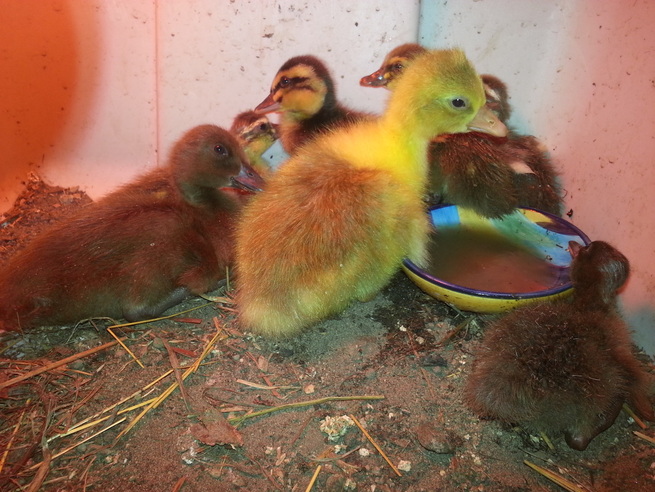
The early candling only is an indicator that the eggs are fertile. Other problems could arise in time, hence the saying, "Don't count your chickens before they hatch!" There is a second set of eggs, duck, turkey, goose, guinea and chicken, that will follow the first by about 9 days. The waterfowl will go to one granary brooder and the chicks, turkey poults and guineas will go to the other. Waterfowl love water even from newly hatched eggs, but are subject to drowning, even in shallow water. They simply tire and stop swimming or dip their heads and sleep and drown. Water with pebbles is a good idea for the first while, with the water being placed in a shallow tub to collect that which was scattered, or the whole brooder will be wet in no time. Turkey poults must be taught to eat and drink, normally a task their mother would do, but they will copy the chicks, so raising them together is also beneficial for the turkeys. Chicks without a mother must learn many things for themselves that they would otherwise have been taught, such as which food is tasty and which should not be eaten when they are foraging, how to avoid danger, and so on. Loud noises can frighten chicks without mothers and they will pile one on top of the other to the extent that those on the bottom cannot breathe and will suffocate and die. Hen raised babies are always so much better.
The Fat Ewe Farm intends to offer these two hatches for sale and if there is a demand, possibly a third and fourth hatch will be set. The birds for the farm will be mother raised if possible. Next year, there will be Silkie hens added to the coop. Silkies are gentle fluffy birds that are known for being excellent mothers and for brooding their own babies, plus the eggs of whatever is stuffed under them, so they will be the incubators! And that is hatching for 2014 at The Fat Ewe!

 RSS Feed
RSS Feed